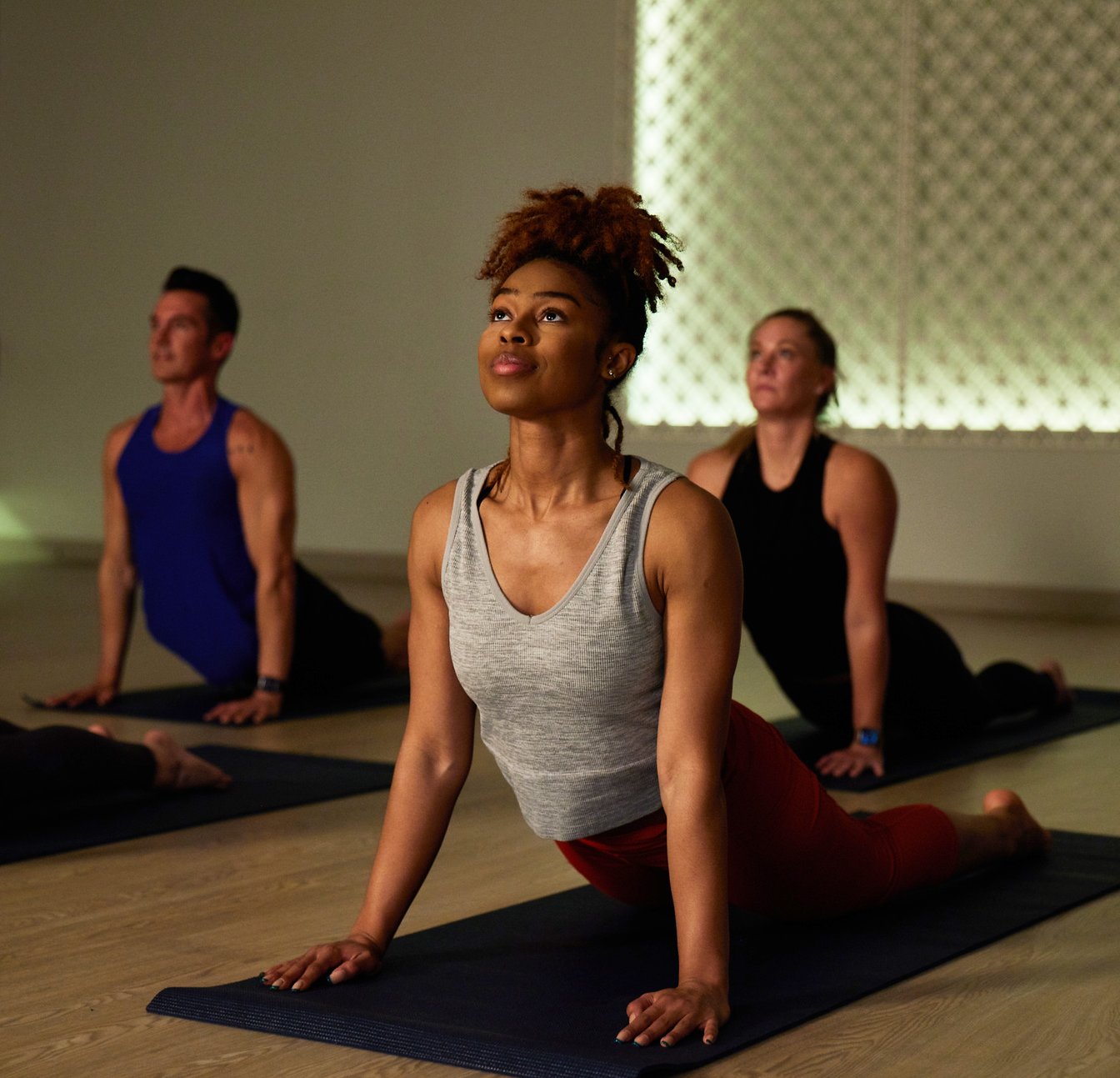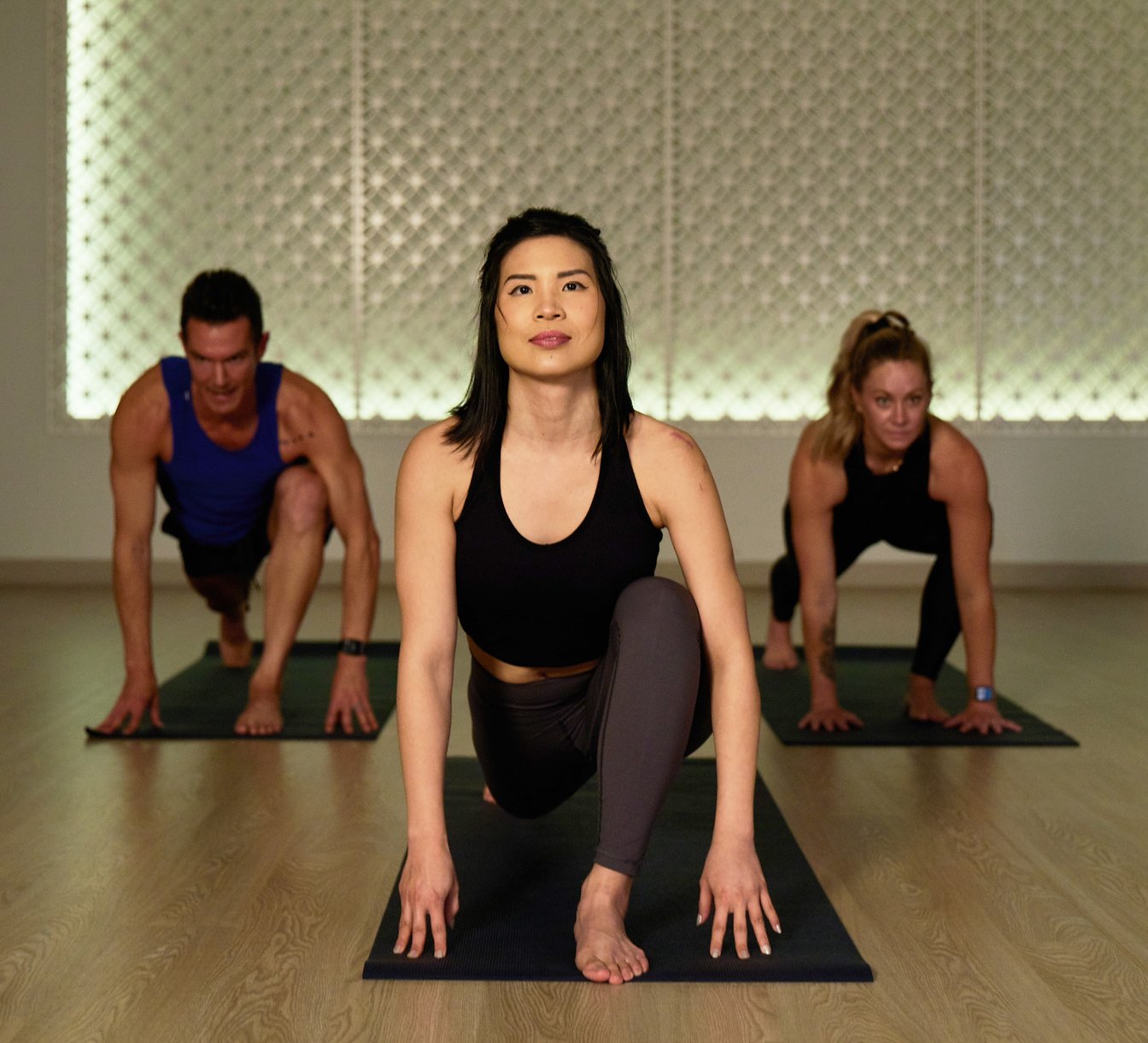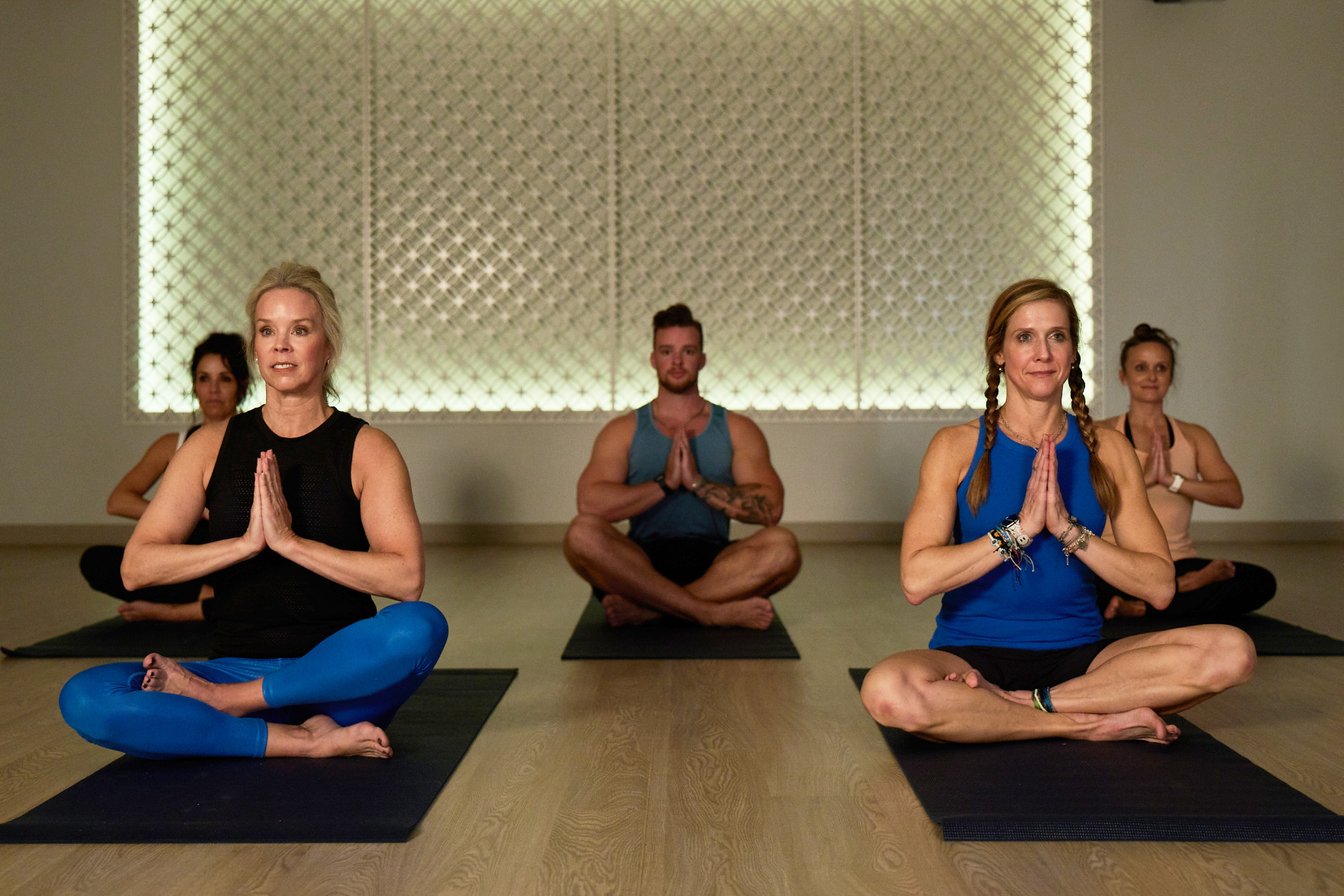The Benefits Of Meditation And Mindfulness In Fitness
The Benefits Of Meditation And Mindfulness In Fitness
Maintaining concentration during workouts can often feel like a battle against our minds. Trust me, this isn’t unfamiliar territory – we've wrestled with these same distractions.
Surprisingly, the solution might be more ancient than you'd think: current scientific research now supports that mindfulness could significantly elevate your workout routines, impacting your mental and physical health profoundly.
In this blog post, we'll delve into how weaving mindfulness practices into your meditation morning routine hones your focus and promotes a more profound sense of well-being.
Are you ready to revolutionize the way you exercise? Let's jump right in.
Key Takeaways
- Integrating meditation and mindfulness into fitness routines enhances focus, reduces exercise-induced stress, and increases body awareness.
- Mindful breathing during exercise promotes heightened self-awareness, reduced stress, and improved physical performance.
- Body scan techniques before and after workouts aid mental preparation, relaxation, and recovery.
Understanding Meditation and Mindfulness

Mindfulness is the practice of being fully present and engaged in the current moment, while meditation helps focus attention and awareness. Both techniques help cultivate a more centered and calm state of mind, promoting emotional regulation and reducing stress.
Definition of Mindfulness
Mindfulness is the practice of being fully present in the moment, aware of where we are and what we’re doing, without becoming overwhelmed by what’s happening around us. It's about noticing our thoughts, feelings, bodily sensations, and surrounding environment with an open and non-judgmental attitude.
This might sound simple, but developing this awareness often requires patience and practice.
By integrating mindfulness into our fitness routines, we can transform exercise from a task into a rich experience that nurtures both mental and physical health. We learn to tune into our bodies, recognizing tension or discomfort early on, which could prevent injuries.
Paying attention to breath and movement during workouts enhances our connection between mind and body, leading to more effective training sessions.
Core Elements of Meditation
We understand the importance of centering our minds to achieve a state of calm and focus, especially when pursuing health and fitness goals. Meditation invites us to pay attention to our breath, often seen as the cornerstone of a morning meditation practice.
This mindfulness of breathing requires us to listen closely to each inhale and exhale, fostering deep relaxation and a sense of being grounded in the present moment.
Let's practice compassion-focused meditation, directing kind intentions toward ourselves and others. Reciting mantras or phrases silently in transcendental meditation can become an anchor for our thoughts, guiding us away from distractions.
Regularly dedicating at least 20 minutes to these exercises allows our minds enough time to settle into a state that enhances mental clarity and emotional resilience—a true asset for anyone integrating mindfulness with their fitness journey.
The Interconnection of Fitness, Morning Meditation, and Mindfulness

Fitness, meditation, and mindfulness are interconnected by their ability to enhance workout focus and reduce exercise-induced stress.
Enhancing Workout Focus
We understand how easily our minds can drift while trying to stay on track with our fitness goals. To sharpen workout focus, we embed morning meditation and mindfulness practices into our routine, even if you are not a morning person.
This promotes calm and equips us to be kinder toward ourselves, especially when challenges arise during exercise. We embrace techniques like focusing on breathing or engaging in tai chi because they help induce a relaxation response that keeps distractions at bay.
Our approach includes both informal and formal mindfulness exercises. By paying close attention to the sensations of each movement and staying rooted in the present, we avoid daydreaming and maintain a strong connection with our activities.
It's amazing how tuning in to breathing or expanding awareness can significantly boost concentration levels during workouts. This heightened focus allows for more effective sessions, where every rep counts and each stride is purposeful.
Exercise-Induced Stress
Exercise can sometimes trigger stress in our bodies, but we've got great news! Bringing morning meditation and mindfulness into your fitness routine isn't just for the mind; it also goes a long way in helping your body relax.
By initiating the relaxation response during exercise, we directly counteract stress. Instead of tensing up and preparing for 'fight or flight,' our bodies unwind and recover more effectively.
Incorporating practices like accepting what comes to mind without judgment during workouts makes a huge difference. It's about being gentle with ourselves when thoughts arise or if we miss a step in our morning meditation routine.
Mindfulness teaches us kindness toward ourselves, transforming potentially stressful exercise into an opportunity for personal growth and self-care. Let's embrace these moments on the mat or at the gym as chances to foster inner peace alongside physical strength.
Benefits of Integrating Mindfulness into Fitness Routines

Integrating mindfulness into fitness routines can increase awareness of body movements and alignment, improve recovery time, and enhance motivation for regular workouts.
Increased Awareness and Body Tuning
Regular meditation and mindfulness can lead to heightened awareness and improved body tuning. Concentration meditation techniques, tai chi, and yoga reduce the body's response to stress, fostering a greater sense of bodily awareness and control.
Through mindfulness practices, individuals learn to accept whatever arises in their awareness, leading to increased sensitivity towards their physical sensations and cues. These practices not only enhance mental well-being but also contribute significantly to an individual's understanding of their own body and its needs.
Integrating these practices into fitness routines brings a deeper connection between the mind and body during exercise sessions. Developing this heightened level of self-awareness can have profound health benefits for individuals looking to improve their physical health through fitness activities while enhancing overall well-being.
Improved Recovery and Injury Prevention
Improved recovery and injury prevention are essential components of a successful fitness routine. Mindfulness practices, such as meditation and yoga, facilitate these benefits.
Regular mindfulness practice can lead to better recovery from physical strain and prevent injuries during workouts. Techniques like concentration meditation, tai chi, and yoga induce the relaxation response in our bodies, ultimately reducing stress levels and enhancing overall recovery.
Additionally, mindfulness meditation involves observing internal thoughts and bodily sensations without judgment, which contributes to improved recovery and injury prevention.
Acceptance of each moment's arising awareness through mindfulness practices helps individuals journey toward better recovery from physical exertion and an enhanced ability to prevent exercise-related injuries.
Enhanced Enjoyment and Motivation
Mindfulness reduces stress and increases relaxation, enhancing our enjoyment and motivation in fitness routines. We can find joy in our workouts by cultivating a kind and forgiving attitude toward ourselves through mindfulness practice.
Concentration meditation, tai chi, and yoga induce the relaxation response, further boosting our enjoyment and motivation during exercise.
Practicing mindfulness encourages acceptance of whatever arises in awareness. This mindset shift promotes an enjoyable experience during workouts by allowing us to embrace the present moment without judgment or self-criticism.
Mindfulness Techniques for Fitness Enthusiasts
Incorporating mindful breathing during workouts can help increase focus and reduce stress, while performing a body scan before and after exercise can promote physical awareness and aid in injury prevention.
Setting intentions for training sessions can also enhance motivation and enjoyment of the fitness routine.
Mindful Breathing During Exercise
Mindful breathing during exercise is a powerful technique for promoting focus and relaxation. It involves consciously paying attention to the breath, enhancing the mind-body connection, and improving overall performance. Here are some practical ways to practice mindful breathing during exercise:
- Start by finding a comfortable position and taking deep breaths, focusing on the rise and fall of your chest or abdomen.
- Coordinate your breath with your movements, inhaling deeply as you prepare for an exercise and exhaling slowly as you exert effort.
- Stay present in the moment by continuously returning your attention to your breath whenever your mind starts to wander.
- Use positive affirmations, mantras, and your breath to stay motivated and centered during challenging workouts.
- Gradually increase the duration of mindful breathing exercises as you become more adept at integrating this practice into your fitness routine.
- Body Scan for Pre- and Post-Workout
Body scan is a mindfulness technique that promotes relaxation and connection with the body. It aids mental and physical preparation before a workout, relaxation, and recovery afterward. Here are the key steps to perform a body scan for pre-and post-workout:
Begin by finding a comfortable position, either sitting or lying down.
Close your eyes and bring your attention to your breath, allowing yourself to relax.
Starting from your toes, gradually move your awareness up through each part of your body, noticing any sensations without judgment.
Pay attention to areas of tension or tightness, and consciously release any discomfort as you move through each body part.
After completing the scan, take a few deep breaths and acknowledge the state of relaxation in your body.
Setting Intentions for Training Sessions
Setting intentions for training sessions can lead to a more holistic and balanced approach to fitness. This practice encourages mindfulness and enhances the overall experience of each workout. Here are effective ways to set intentions for training sessions.
- Clarify Goals: Begin each session with a clear understanding of what you aim to achieve, whether it's improving strength, endurance, or flexibility.
- Cultivate Positive Mindset: Focus on positive affirmations such as "I am capable," "I am strong," or "I am dedicated" to foster a mindset of determination and resilience during the workout.
- Visualize Success: Before beginning the workout, take a moment to visualize yourself accomplishing your fitness goals, which can enhance motivation and performance.
- Connect with Your Body: Tune in to your body's sensations and energy levels, allowing you to tailor the workout to meet your body's needs for that day.
- Practice Gratitude: Express gratitude for your body's capabilities and the opportunity to engage in physical activity, fostering a sense of appreciation towards your fitness journey.
- Embrace Adaptability: Be open-minded and willing to adapt your approach based on your feelings during the session, allowing for a more intuitive and mindful workout experience.
- Reflect Post-Workout: Take time after the session to reflect on how you felt physically, mentally, and emotionally during the workout, enabling you to adjust future intentions accordingly.
How to Cultivate a Mindful Fitness Practice
Start with short, simple mindfulness sessions to gradually incorporate it into your fitness routine. Keep a journal to track your progress, and consistently practice mindfulness during workouts.
Ready to enhance your fitness experience? Read on for more actionable guidance!
Starting with Short, Simple Sessions of Just a Few Minutes a Day
We can ease into meditation by starting with short, simple sessions. This approach allows us to build our practice and find what works best gradually. Here are some ways to start
- Set aside just 5 - 10 minutes each day for meditation.
- Find a quiet, comfortable space where you will not be disturbed.
- Sit or lie down in a relaxed position.
- Focus on your breath, observing the inhales and exhales.
- When thoughts arise, acknowledge them without judgment and gently return your focus to your breath.
- Experiment with guided meditation apps or recordings to help you stay on track.
Incorporating Mindfulness into Regular Workouts
Fitness enthusiasts can follow these actionable steps to effectively integrate mindfulness into regular workouts.
- Begin each workout with a few minutes of mindful breathing to center and focus the mind, allowing for a more present and intentional approach to the physical activity.
- Practice a body scan before and after workouts, deliberately observing and recognizing any tension or discomfort within the body.
- Set specific intentions for training sessions, such as focusing on form, maintaining steady breath, or simply embracing the joy of movement.
- Cultivate mindfulness by gradually lengthening workout durations spent in mindful states. This allows for an increased sense of awareness and overall engagement with the exercise routine.
- Keep a journal detailing fitness activities and mindful experiences during workouts, noting insights gained, progress made, or any challenges encountered.
Keeping a Mindfulness and Fitness Journal
A mindfulness and fitness journal is valuable for fostering a mindful fitness routine. It enables individuals to stay present, actively engaging in their daily experiences.
By providing an avenue for informal mindfulness to practice meditation during everyday activities, the journal aids in cultivating acceptance and self-kindness. Additionally, it serves as a platform for tracking progress in meditation and mindfulness practices while offering space for thoughtful reflection on reactions to various stimuli with calm composure.
Maintaining such a journal encourages the integration of mindfulness into one's workout regimen and facilitates personal growth by promoting awareness and introspection.
Overcoming Common Challenges
To tackle distractions, practice redirecting your focus back to your breath or the sensations in your body during workouts. Consistency can be maintained by setting specific time blocks for mindfulness practice before or after exercise.
Dealing with Distractions
Dealing with distractions during meditation and mindfulness practices is a common challenge many fitness enthusiasts encounter. Finding a quiet and comfortable space to minimize external stimuli is helpful to overcome this.
Additionally, practicing focused breathing or guided meditation techniques can help redirect your attention to the present moment when thoughts or noises arise. Incorporating mindfulness into daily activities outside formal practice, such as mindful walking or eating, can also train the mind to stay present and focused.
Another effective strategy for managing distractions is acknowledging them without judgment and gently guiding your focus back to the intended point of attention, whether it's your breath or a specific sensory experience.
Maintaining Consistency in Practice
Consistently practicing mindfulness alongside fitness routines can be challenging, but it's essential for reaping the full benefits. Setting a regular meditation schedule and committing to short, manageable daily sessions can help embed mindfulness into your workout habits.
Additionally, keeping a journal to track your progress and experiences with mindful practices can motivate you to maintain consistency.
Making small, intentional adjustments to incorporate mindfulness techniques during workouts can transform your approach to fitness over time. By gradually integrating these practices into your daily routine, you'll build a sustainable habit that enhances physical and mental well-being.
Conclusion
Incorporating meditation and mindfulness into fitness routines offers numerous benefits. It enhances focus during workouts, reduces exercise-induced stress, and increases body awareness.
By practicing mindful breathing, body scanning, and setting intentions for training sessions, fitness enthusiasts can optimize their workout experience. Beginning with short sessions and maintaining consistency in practice is vital in cultivating a mindful fitness routine.
Overcoming common challenges such as distractions further allows individuals to fully embrace the advantages of combining daily meditation practice and mindfulness with physical activity.
Contact Onelife Fitness for information about mindfulness meditation.
FAQs
1. What are the fitness benefits of meditation and mindfulness?
Transcendental meditation and mindfulness can improve mental health, lower blood pressure, and help manage and treat chronic pain more, contributing to better overall fitness.
2. Can meditation help with my workout routine?
Yes! Meditation and mindfulness can increase self-esteem and relieve stress, making workouts more effective by helping you focus on your posture and breathing.
3. How do psychotherapy techniques like cognitive behavioral therapy fit into fitness?
Techniques such as cognitive behavioral therapy used by psychotherapists can assist in changing negative behaviors related to fitness, like coping with anxiety disorders or eating disorders.
4. Has there been research on how mindfulness affects physical health conditions?
Research suggests that practices like Mindfulness-Based Stress Reduction (MBSR), developed by Jon Kabat-Zinn, can positively affect heart disease symptoms and strengthen areas of the brain associated with emotions, such as the amygdala.
5. Is it okay to combine different therapies for wellness, such as practicing yoga or working with a personal trainer while doing mindfulness exercises?
Absolutely! Combining mindfulness-based interventions with physical activities recommended by a personal trainer enhances physical conditioning and psychological well-being.
6. Are there scientific studies supporting the use of mindfulness meditation for treating specific health issues?
Yes! Numerous randomized controlled trials support using evidence-based practices like MBSR for treating conditions from substance abuse to post-traumatic stress disorder.